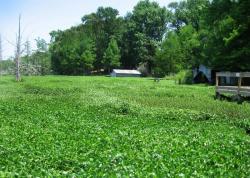 Each year, Arkansas Game and Fish biologists spend thousands of dollars trying to control nuisance aquatic plants. One species in particular, the non-native alligatorweed, has commanded the better part of biologists' attention and resources in central Arkansas lakes like Lake Conway for the past 15 years. When temperatures rise above 60 degrees, alligator weed flourishes, and that means it can be prevalent here for six to seven months each year. Floating mats of dense alligator weed can make it impossible to navigate through with boats. The plant can spread by seeds, but most often grows from buds and fragments of existing plants, which makes eliminating the nuisance plant extremely difficult. The combination of mechanical removal, chemical sprays and placing insects or fish in the area that will eat the vegetation works for some nuisance plants, but not alligator weed. So AGFC biologists have to attack it in other ways in places like Lake Conway, Lake Overcup and in Lake Cargile, the latest to show signs of alligator weed. Anglers can help in the fight, too.
Each year, Arkansas Game and Fish biologists spend thousands of dollars trying to control nuisance aquatic plants. One species in particular, the non-native alligatorweed, has commanded the better part of biologists' attention and resources in central Arkansas lakes like Lake Conway for the past 15 years. When temperatures rise above 60 degrees, alligator weed flourishes, and that means it can be prevalent here for six to seven months each year. Floating mats of dense alligator weed can make it impossible to navigate through with boats. The plant can spread by seeds, but most often grows from buds and fragments of existing plants, which makes eliminating the nuisance plant extremely difficult. The combination of mechanical removal, chemical sprays and placing insects or fish in the area that will eat the vegetation works for some nuisance plants, but not alligator weed. So AGFC biologists have to attack it in other ways in places like Lake Conway, Lake Overcup and in Lake Cargile, the latest to show signs of alligator weed. Anglers can help in the fight, too.Biologists Wrestle Alligator Weed
 Each year, Arkansas Game and Fish biologists spend thousands of dollars trying to control nuisance aquatic plants. One species in particular, the non-native alligatorweed, has commanded the better part of biologists' attention and resources in central Arkansas lakes like Lake Conway for the past 15 years. When temperatures rise above 60 degrees, alligator weed flourishes, and that means it can be prevalent here for six to seven months each year. Floating mats of dense alligator weed can make it impossible to navigate through with boats. The plant can spread by seeds, but most often grows from buds and fragments of existing plants, which makes eliminating the nuisance plant extremely difficult. The combination of mechanical removal, chemical sprays and placing insects or fish in the area that will eat the vegetation works for some nuisance plants, but not alligator weed. So AGFC biologists have to attack it in other ways in places like Lake Conway, Lake Overcup and in Lake Cargile, the latest to show signs of alligator weed. Anglers can help in the fight, too.
Each year, Arkansas Game and Fish biologists spend thousands of dollars trying to control nuisance aquatic plants. One species in particular, the non-native alligatorweed, has commanded the better part of biologists' attention and resources in central Arkansas lakes like Lake Conway for the past 15 years. When temperatures rise above 60 degrees, alligator weed flourishes, and that means it can be prevalent here for six to seven months each year. Floating mats of dense alligator weed can make it impossible to navigate through with boats. The plant can spread by seeds, but most often grows from buds and fragments of existing plants, which makes eliminating the nuisance plant extremely difficult. The combination of mechanical removal, chemical sprays and placing insects or fish in the area that will eat the vegetation works for some nuisance plants, but not alligator weed. So AGFC biologists have to attack it in other ways in places like Lake Conway, Lake Overcup and in Lake Cargile, the latest to show signs of alligator weed. Anglers can help in the fight, too.

 Advertising
Advertising